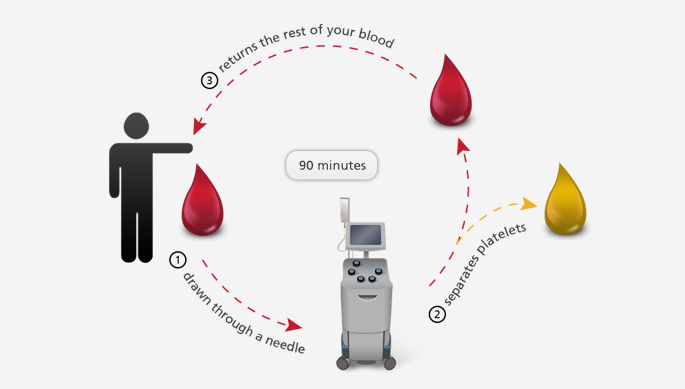
Platelets are an amazing part of your blood. It is the smallest of our blood cells and literally looks like small plates in their non-active form. Platelets control bleeding with their clotting process. Wherever a wound occurs, the blood vessel will send out a signal. Platelets receive that signal and travel to the area and transform into their active formation, growing long tentacles to make contact with the vessel and form clusters to plug the wound until it heals.
When the platelet count is low, bleeding may occur from any part of the body and can lead to serious complications.
They prevent or stop bleeding and are life-saving therapy for patients undergoing chemotherapy for cancer treatment, leukemia, bone marrow transplants, organ transplants, and open-heart surgery. Children undergoing therapy for cancer and leukemia often need platelets. Due to recent advances in the treatment of these illnesses, the demand for platelets is growing dramatically.
Any healthy person aged between 18 to 55 and with body weight above 60 kg can be a platelet donor in Kerala.
The process is similar to giving blood, but using specialist equipment called a cell separator. The cell separator extracts platelets from donor blood and the rest of the blood is returned back to the donor.
The platelet donation typically lasts from 60 to 90 minutes, You can expect the whole process takes up to three hours. During which time you can read or simply relax.
Since platelets only have a shelf life of five days.
The hospital demand for them is constant.
Less than 10% of your platelets will be collected during a platelet donation. The total volume of your donation will not exceed 8% of your blood volume. The donated platelets will be replaced within 24- 48 hours.
Up to 24 times a year with a minimum interval of 2 days between prior donations.
Due to the flexibility of platelet donation, many donors create their own schedules. We have some donors that donate twice a month, once a month, once a year or whenever they can. And every donation is appreciated and there is a tremendous need for platelet donors.
A platelet donation allows the collection of a large number of platelets from a single donor. The specialized technology separates and collects just the platelets and returns the red cells and plasma to the donor.
To equal the quantity of one platelet donation, we would have to combine or "pool" the platelets from six different whole blood donations from six different donors.
YES ! We have several donors that donate both whole blood and platelets. Due to the difference in donation frequency guidelines, donor can arrange to fit both types of donations in their schedule.
yes it is safe. Platelet donations are performed in a highly-controlled, sterile environment by professionally trained staffs. All platelet collection equipment is sterilized and equipment that is in contact with the donor's blood is used only once and that is eliminating the possibility of transmitting any viral infection
You cannot donate platelets if you have taken aspirin, aspirin-containing medications, like pain killers, such as Ibuprofen, Diclofenac in the last 48 hours.